Blog posts by Dina Canup
-
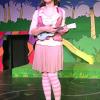
Athens Little Playhouse's Seussical Lets in the Sunshine
Blog: Culture Briefs
“Small has always been big in the world of Dr. Seuss,” according to Charles Isherwood of The New York Times, “where the battles fought by underdogs, outcasts and freethinkers are championed in squiggly line and rhythmic rhyme.” The real-life underdogs and freethinkers of the world are often under a cloud of fear, and we need our sunshine and champions today more than ever. The smaller actors of Athens might be the perfect ones for the job, here to let their hope and determination shine in this cheerful show.
Seussical is about believing in the power of imagination and community despite mockery and opposition. Narrated by the Cat in the Hat (Anna Tenner), Horton the elephant (Emma Scott) believes a speck of dust can contain a world of its own. He vows to protect it even though others mock him. And he’s right; it contains the Whos, including a daydreaming boy named JoJo (Desmond Schmutte) who is sent to military school for “thinking too many thinks.” Horton has a good heart—and one good friend named Gertrude McFuzz (Cubby Rupers) who believes in him—so he faces down the haters and real dangers to protect those who are smaller and more vulnerable than himself.
-

Oconee Youth Playhouse Presents A Christmas Story for Those Who Don't Want Christmas to Be Over
Blog: Culture Briefs

Photo Credit: Kent Hannon
The Old Man (Jeremiah Smith), Mother (Isabel Arenas), Ralphie (Benjamin Bragg) and his little brother Randy (Nate St. Onge).
If you still haven’t taken down your Christmas decorations, Oconee Youth Playhouse has the play for you—especially if your holiday traditions include the 24-hour marathons of cult classic A Christmas Story. Now you can revel in the nostalgia of pre-digital age childhood yearning in live musical form! -
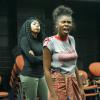
Local Theater Can Help You Cope in Times of Darkness
Blog: Culture Briefs

Photo Credit: Dorothy Reeves
Hawa Camara as Maima (left) and Nickasey Freeman as The Girl (right) in Eclipsed
In times of fear and despair, we need the arts more than ever. Sometimes we need to escape and other times—and this is one of them—we need art that makes us reflect, gives us strength and perhaps offers glimmers of hope for humanity despite overwhelming darkness. As arts administrator, advocate and writer Howard Sherman writes,
On this post-election morning of November 9, I am reminded that the theatre is my America, because it embraces a multiplicity of stories, of possibilities, of harsh realities and of unimaginable dreams. Its stories are the stories I want to have told, its songs are the songs I want to sing while driving on an autumn day. It is the place where I meet and commune with people on stage and in the audience, inclusive of all ages, genders, sexualities, races, ethnicities, or disabilities. I don’t look to the theatre for escape, but for engagement, which includes the potential for epiphany and joy.
We’re not ready for comedy or pure escapism right now. It’s time to stare harsh reality in the face and find hope and courage where we can.
-

This Week in Local Theater: Jane Eyre and Lady of Angria
Blog: Culture Briefs
Jane Eyre: The beloved novel tells the story of a mistreated orphan, Jane Eyre (Brittney Harris), who grows up to become a governess and the unlikely love object of the brooding Mr. Rochester (John Terry). This adaptation takes the Brit lit classic in a bold direction by reimagining Bertha (Brandy Sexton), the insane-in-the-attic wife of Mr. Rochester. Here she is the passionate, darker side of dreamy yet prudish Jane, who has worked hard all her life to repress emotions society has told her are forbidden. With popular, Atlanta-based guest director David Crowe and top-notch set and costumes in the historic Fine Arts Theatre, this one should please both literature lovers and fans of innovative theater.
-

Big Hair and Big Messes in Theater News This Month
Blog: Culture Briefs
Hairspray: The Oconee Youth Playhouse has “gone big” for this teenage musical about big hair, big change and big love in the early 1960s: they’ve rented wigs, costumes and set pieces directly from a company that produced one of the national tours. It’s a powerful mix when you add their usual high standard for choreography and strong local teenage talent, which includes Gracin Wilkins as dancer/activist/dreamer Tracy Turnblad and Cameron Loyal—who is heading off to the American Academy for Dramatic Arts this fall—as Seaweed Stubbs.Hairspray is a Tony Award winner that celebrates dance, competition, celebrity, rebellion, and—of course—hair. It’s best done by teenagers, and OYP offers some of the best.
-

In the Heights Opens at Lawrenceville's Aurora Theatre
Blog: Culture Briefs
Let’s face it, most of us will not get to see Hamilton anytime soon. Even when it starts touring a year from now or more, season subscriptions to the various venues are likely to sell out before individual tickets can even go on the market. Creator and star Lin Manuel Miranda has changed the world of musical theater, but remember that his non-stop revolution began withIn The Heights, the 2008 Tony Award-winning Broadway musical with a Latin pop, hip-hop and salsa soundtrack. Luckily, you now have a chance to see it at the Aurora Theatre in Lawrenceville.Sure, Hamilton and In the Heights are two different musicals, and part of what makesHamilton revolutionary is Miranda’s diverse, contemporary portrayal of our founding fathers building a new nation. But In the Heights was revolutionary in its own way (while set in the present day and among everyday people) and equally concerned with diverse “dreamers of American dreams, nervously eyeing their futures from a city block on the cusp of change,” as Sara Krulwich of the New York Times described it in her 2008 review. With music and lyrics by Miranda, the book by Quiara Alegria Hudes got mixed reviews for its sentimentality. Krulwich called it a “salsa-flavored soap opera,” but overall was charmed by “this scrappy little musical about chasing your dreams…if there is an equivalent of schmaltz in Spanish, this musical is happily swimming in it.” -
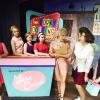
This Month in Theater: Hairspray and Godspell
Blog: Culture Briefs

Photo Credit: Ralph B. Maxwell, Jr.
(L to R) Delaney Morcom, Kelly Belle McCoy, Katelynn Tiller, Taylor Cleveland, Leslianne Hopkins, Georgia Laster and Claire Korzekwa
Hairspray: A celebration of early ’60s dance music, social change and teen dreams, Hairsprayis a happy, Tony Award-winning musical about an outrageously optimistic dance show fanatic named Tracy Turnblad (Georgia Laster). She’s described as “pleasantly plump” and gets in trouble at school for “inappropriate hair height,” but she dreams of appearing on “The Corny Collins Show.”
-

What's Happening in Local Theater This Weekend
Blog: Culture Briefs
Our Town It’s the final weekend of an American classic at Winder Barrow Community Theatre, directed by Léland Downs Karas. Thornton Wilder’s Our Town won a Pulitzer Prize in 1938; when it was revived in 1989 it won a Drama Desk Award and a Tony Award. The masterfully metatheatrical script sets the play in a theater rather than a place, though the theater stands for a fictional town called Grover’s Corners.
-
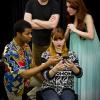
Upcoming Theater Performances, Sketch Comedy, Ethnic Nights
Blog: Culture Briefs
New Play Festival: UGA students have been turning out an astonishing amount of dramatic writing in recent years, not simply in quantity but in quality of an impressive level. Clearly it’s high time to feature a sampling of some of the best work by current students and recently graduated alumni. There are seven playwrights and four directors. The whole thing is overseen by executive director John Patrick Bray, a UGA professor who is also a notable playwright himself. It’s an eclectic collection of plays, but Bray has noticed an emerging theme of the supernatural, family connections (and the lack thereof), and babies both born and unborn. He's joined by two PhD students (Geoffrey Douglas, Seth Wilson) and an MFA acting student (Ami Sallee) in directing the seven plays with a strong ensemble of student actors.
-
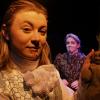
This Weekend in Theater: The Mandrake, Back to the Summer & The Moore, The Merrier
Blog: Culture Briefs

Photo Credit: C. Adron Farris III
Drew Atkinson as Callimaco and Hannah Klevesahl as Calfucci in University Theatre's production of Machiavelli's The Mandrake.
The Mandrake: Who runs the world? Girls! Specifically, girls dressed as boys who are treating girls like sex objects. And those girls are literally puppets. This mad, mad world is University Theatre’s innovative take on Machiavelli’s misogynistic comedy where the end justifies the means as long as you get what you want—assuming you are a man. Or a woman playing a man in this case.
-
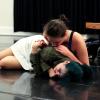
New Theater Offerings Coming Up Fast
Blog: Culture Briefs

Photo Credit: Myles Haslam
Drew Mancini (above) and Jamie Ascher (below) portray two women bonding over an unwanted pregnancy in Dry Land.
Dry Land
Two teenage girls in a locker room grow close attempting to undo an unwanted pregnancy, trying to find a safe place in a world that seems small and dangerous to them at that moment in time. This play shows that bodies can be frightening, especially to young women lacking true ownership over their bodies and their sexuality. One of the girls says to the other about her sexual experience, “It was sexy, but also really ugly, because sex is ugly.”
Page 1 of 1, showing 11 records out of 11 total, starting on record 1, ending on 11
latest stories
-
Culture Briefs | January 27, 2017 2:20pm
Athens Little Playhouse's Seussical Lets in the Sunshine
-
Culture Briefs | January 13, 2017 4:00pm
Oconee Youth Playhouse Presents A Christmas Story for Those Who Don't Want Christmas to Be Over
-
Culture Briefs | November 9, 2016 4:13pm
Local Theater Can Help You Cope in Times of Darkness
-
Culture Briefs | November 7, 2016 11:57am
This Week in Local Theater: Jane Eyre and Lady of Angria
-
Culture Briefs | August 22, 2016 1:50pm
Big Hair and Big Messes in Theater News This Month
-
Culture Briefs | July 25, 2016 12:35pm
In the Heights Opens at Lawrenceville's Aurora Theatre
-
Culture Briefs | June 16, 2016 1:22pm
This Month in Theater: Hairspray and Godspell
-
Culture Briefs | June 2, 2016 12:15pm
What's Happening in Local Theater This Weekend
-
Culture Briefs | March 24, 2016 11:39am
Upcoming Theater Performances, Sketch Comedy, Ethnic Nights
-
Culture Briefs | February 18, 2016 4:41pm
This Weekend in Theater: The Mandrake, Back to the Summer & The Moore, The Merrier
-
Culture Briefs | October 22, 2015 11:35am
New Theater Offerings Coming Up Fast












